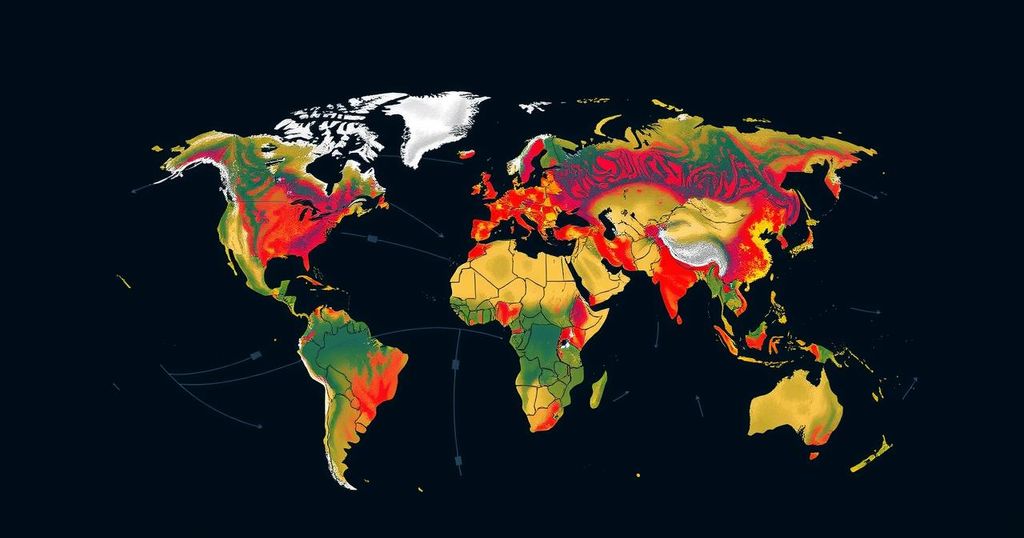A recent report underscores the escalating health risks linked to climate change, highlighting record threats from extreme weather, disease spread, and food insecurity. The findings, presented by 122 experts, reveal alarming statistics, including a 167 percent increase in heat-related deaths among seniors since the 1990s. Significant progress in pollution reduction and renewable energy adoption is noted, but experts stress the urgency for immediate action to mitigate further health crises. The report coincides with critical upcoming climate discussions and highlights the need for stronger commitments to address these global challenges.
A recent report highlights the increasingly alarming impact of climate change on global health, noting unprecedented threats arising from escalating extreme weather events, infectious diseases, and food insecurity. As the year 2023 is projected to be the hottest on record, the report was released in the lead-up to significant climate discussions at the upcoming United Nations COP29 conference, while the political landscape in the United States is poised for change with potential implications for climate policy under the possible return of climate change skeptic Donald Trump to office. Compiled by 122 experts, including those from the World Health Organization, the eighth installment of the Lancet Countdown on health and climate change shows that 10 out of 15 monitored indicators have reached distressing new heights. Noteworthy findings include a 167 percent increase in heat-related fatalities among individuals aged over 65 since the 1990s, a proliferation of vector-borne diseases like dengue, and widespread food shortages resulting from droughts and floods. Marina Romanello, executive director of the Lancet Countdown, emphasized that these threats to health and survival extend to all countries, marking levels of danger never before witnessed. Moreover, deforestation has led to a significant decrease in the Earth’s ability to absorb carbon dioxide, exacerbating the climate crisis. The report reveals that despite long-standing warnings, greenhouse gas emissions have continued to rise, with oil and gas corporations ramping up fossil fuel production, capitalizing on economic recovery following the COVID-19 pandemic and the ongoing war in Ukraine, which has seen fossil fuel subsidies reach $1.4 trillion in 2022. On a more hopeful note, the report identified some commendable progress; deaths attributable to fossil fuel-related air pollution dropped by nearly seven percent from 2016 to 2021, and the production of clean renewable energy has significantly increased. Romanello underscored the importance of urgent action to mitigate further dangers: “If action is not taken today, the future will be very dangerous. There is really no more time to waste… the wasted time has been paid in lives.” The report encourages individuals to adopt climate-friendly practices, support sustainable policies, and advocate for stronger commitments to address climate change—and its health implications—at both local and global levels.
The context of this report arises from the unrelenting effects of climate change, as evidenced by heightened incidents of natural disasters and significant disruptions to food security and public health systems worldwide. Climate change is increasingly recognized as a critical risk factor for various health outcomes, including heat-related illnesses, increased incidence of infectious diseases, food shortages due to agricultural disruption, and mental health challenges arising from extreme weather events and displacement. The report serves to inform policymakers and stakeholders ahead of substantive negotiations at COP29, emphasizing the urgency for decisive action in addressing these interconnected crises.
In summary, the Lancet Countdown report reveals a dire relationship between climate change and human health, marked by record-breaking threats manifesting in rising mortality rates, infectious disease spread, and food insecurity. While there have been some positive developments in reducing pollution and increasing renewable energy usage, the overarching message calls for urgent and unified action to mitigate the climate crisis. Without such intervention, the historic trends in health deterioration due to environmental changes are likely to worsen, indicating a pressing need for systemic change and the prioritization of public health in climate policies.
Original Source: www.barrons.com







